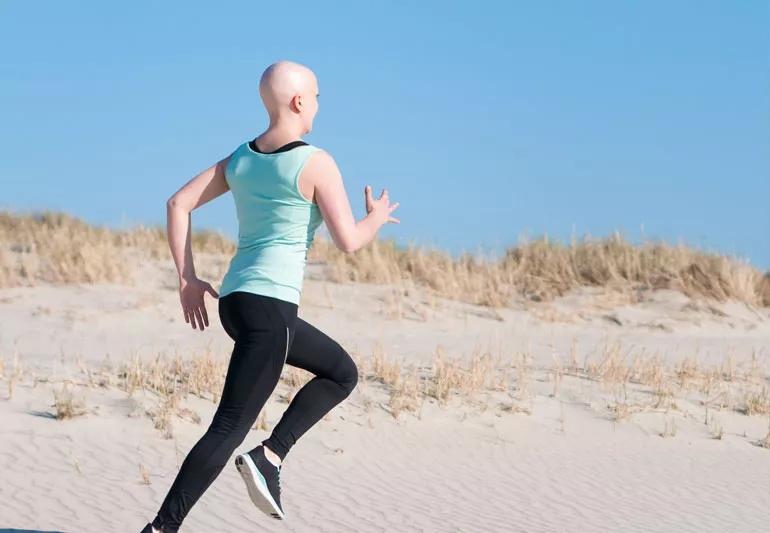Add physical activity to your daily routine

Image content: This image is available to view online.
View image online (https://assets.clevelandclinic.org/transform/61580a06-e6a5-44fd-9719-ad8779a9d5d7/cancerExercise-519012389-770x553_jpg)
Cancer patient running on the beach
After you receive a diagnosis of cancer, starting or maintaining an exercise routine might seem like the least of your worries.
Advertisement
Cleveland Clinic is a non-profit academic medical center. Advertising on our site helps support our mission. We do not endorse non-Cleveland Clinic products or services. Policy
That’s understandable. Regular exercise might be something you didn’t seem to have time for even before your diagnosis. With all the new demands of treatment, such as medical tests and doctor’s visits, exercising may seem to be an even less likely prospect.
But cancer care nurse Josette Snyder, BSN, MSN, AOCN, says there are many good reasons to think about keeping some sort of physical activity routine while being treated for cancer.
Most important among them is that a number of studies have shown that regular physical activity is linked to increased life expectancy after a diagnosis of cancer ― in many cases by decreasing your risk of cancer recurrence.
Recent research also has shown that moderate exercise can improve your physical, mental and emotional well-being, Snyder says. Exercise can help you control your weight, sleep better and elevate your mood, offering drug-free relief for the feelings of sadness that can accompany a cancer diagnosis.
Regular physical activity also increases muscle strength and flexibility, which may be impaired by surgery and some therapies, she notes. Exercise also will improve your cardiovascular function and protect your bones. Exercise has the power to reduce stress, gives you more energy and may speed your recovery from cancer treatment.
Cancer treatments such as chemotherapy, radiation and bone marrow transplants can reduce your energy, Snyder says. That’s because while cancer drugs attack cancer cells, they also strike healthy cells, including red blood cells. As a result, patients can develop anemia, which causes them to experience fatigue.
Advertisement
“Among our patients, fatigue is the most-cited physical effect of cancer treatment,” she says. “Although fatigue usually lessens or stops after treatment is over, it is a very common problem for those with cancer.”
It may seem counterintuitive, but exercise can help you to manage your fatigue. Studies show that those with cancer who exercise regularly reported experiencing 40% to 50% less fatigue. So while it may require much effort at first to get up and move around, exercise will provide a long-term benefit of reducing fatigue.
Of course, be sure to talk with your healthcare team about whether, when and which exercise is appropriate for you, Snyder recommends.
“There may be times ― such as immediately after surgery ― when you may need to take a break from physical activity so that your body can heal,” she says.
Also, you may have conditions or symptoms, such as lymphedema, that will need to be taken into consideration in deciding what kind of physical activity you want to do.
You may need to modify your exercise routine occasionally to allow for “down” days in the treatment cycle. For example, if you are undergoing chemotherapy, you may wish to avoid or scale back exercise on the days when side effects from treatment are more pronounced. Or if you are receiving radiation therapy, exercise may need to be reduced, or in some cases avoided, toward the end of treatment or in the weeks immediately after treatment ends.
Exercise doesn’t have to be an hour of high-powered aerobics or running long distances. It can take the form of almost any kind of physical activity.
The National Comprehensive Cancer Network (NCCN) advises starting slowly and increasing your activity a little bit at a time. Depending on your fitness and comfort level, you may want to start with a 10-minute walk around the block. Others may find they can exercise for 20 minutes or longer right away.
Try for at least 30 minutes of aerobic exercise five days a week or more. But take it easy. If you try to do too much, you may become discouraged and stop exercising altogether.
If you were a regular at the gym before cancer, you may have to lower the intensity of your workouts for a while.
Be sure to listen to your body and scale back your efforts when your body needs to. Some days you may have less energy than others, so know that it’s all right not to push yourself to top your last exercise session. Sometimes the goal merely will be to finish the workout. Don’t exercise if you’re not feeling well or running a fever.
Here are some additional suggestions from the NCCN:
Advertisement
Advertisement

Sign up for our Health Essentials emails for expert guidance on nutrition, fitness, sleep, skin care and more.
Learn more about our editorial process.
Advertisement
Prioritize protein and fresh produce, but be extra careful to avoid bacteria that could cause foodborne illnesses
Here’s how (and why) to ask your doctor about treatment goals, second opinions, clinical trials and more
Rates of early-onset breast, colorectal and GI cancers are increasing, but preventive care and a healthy lifestyle can help reduce your risk
The side effects of cancer and treatment can impact desire, sexual function and intimacy, but there are ways you can keep the flame going
Decisions you make regarding smoking, alcohol use, meal choices and exercise can make a big difference
Taming fear and reclaiming your future after treatment
Carcinomas are the most common and affect skin and organs
7 healthy eating tips to help reduce your risk of some of the most common types of cancer
Prioritize your health by managing stress, strengthening your social connections and getting quality sleep
Bolsters, blankets, pillows and blocks can offer extra support, stability and comfort
Allergies, postnasal drip, asthma or reflux could be to blame for a cough that won’t quit